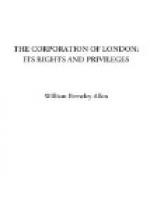PART II.
THE CIVIC REFORM BILL.
The Commission of Inquiry—The New Wards—Aldermen and Common Councilmen—City Expenditure—City Receipts and Removal of Restrictions.
The Commission of Inquiry.
In the year 1834 a commission was appointed “to inquire into the existing state of the municipal corporations, and to collect information respecting their defects.” These commissioners applied themselves to the discharge of their somewhat invidious duties with both earnestness and impartiality, and in their Report, published in 1837, acknowledged the superior excellence of the London Corporation as compared with other corporate bodies. They readily admitted that the Common Council possessed the necessary powers to effect whatever reforms might have become necessary through the lapse of time. They also bore witness that the Corporation had already of itself corrected much that was amiss in its constitution, and that its history furnished “honourable testimonials to the vigilance, good sense, and justice of its legislative body.” On these grounds the Imperial Legislature expressly exempted the City of London from the action of the Municipal Corporations Act, and left it in the undisputed enjoyment of its ancient franchises—which, moreover, are declared by 2 William & Mary not to be liable to confiscation. A period of twenty years then passed away without any cause of complaint having occurred to justify the interference of Government, until some disputes arose on the subject of the City markets, and the conservancy of the Thames. Sir George Grey at once availed himself of this pretext to appoint a commission to investigate “the existing state of the Corporation of the City of London, and to collect information respecting its constitution, order, and government.” These commissioners, unlike their predecessors, exhibited from the commencement of their proceedings a strong bias and feeling of hostility against the Corporation. The witnesses they called before them were, with scarcely an exception, the avowed enemies of the existing state of things, and prepared to convert trifling blemishes into radical and monstrous defects. And yet even these did not agree among themselves, or assign any sound reasons to render compulsory innovations expedient or justifiable. The general tenor of their evidence, indeed, was actually in favour of the Corporation, when due allowance is made for the spirit by which they were actuated. Nevertheless, it was upon the report of this one-sided and unconstitutional commission that the late ministry founded their Bill for “the better Regulation of the Corporation of the City of London.” They had arrived at a foregone conclusion, and asked for only the shadow of an excuse to mask their preconcerted designs against the chief and last stronghold of self-government. The fate of the Corporation was clearly doomed from the hour the House of Commons sanctioned the appointment of a prejudiced and illegal tribunal.




